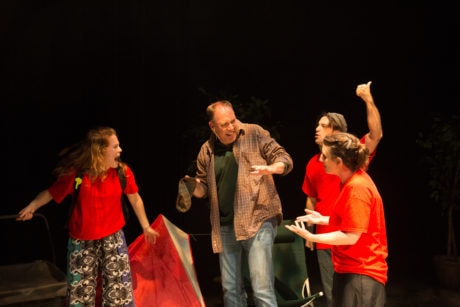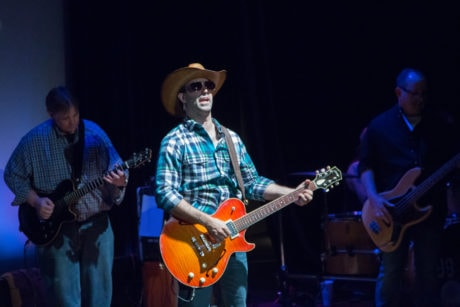Musical theater and the country could use a good renegade rock musical inspired by the Occupy Movement. The demonstrations that spread across America spurred by Occupy Wall Street shared a kindred spirit and antiauthoritarian fervor with the 1960s Anti–Vietnam War Movement—out of which, lest we forget, the groundbreaking musical Hair arose. And as the revival of Hair recently at Keegan Theatre made plain, that “American Tribal Love-Rock Musical” is by no means a museum piece. (I called that production “radiant and thrilling…an exuberant love fest as timeless as human hope.”)
Something along those lines must have occurred to Writer Mark Baughman and Director Jonathan Zuck, whose 99 – A Rock Opera opened last night at the Silver Spring Black Box Theatre. (Baughman wrote everything, book, lyrics, and music; Zuck produced.) It’s set in a park in Cleveland where an Occupy Cleveland demonstration is in progress, and the 99 in the title refers to the 99 percenters, on behalf of whose interests a protest against the wealthiest one percent took hold around the globe. (Somehow those interests got rabble-roused of late in Cleveland without quite the same egalitarian political vision or clarity of fiscal focus—it turned into more of an exuberant hate fest, actually. But I digress.)

99 – A Rock Opera has a really cool staging concept going for it. The black box playing area is a public park lined by potted trees. Across the stage floor are spread swaths of artificial turf and oversize protest signs. Once the show starts, a huge projection screen displays archival stills and video from the real Occupy Cleveland action. (Betsy Zuck did the set design; Nathan Collard did the lighting design.) And seated all over in folding lawn chairs are members of the audience, meaning that they are inside the action as if participants in the occupation.
Though this setup meant some neck craning as the actor/singers played scenes among them, it was about as up-close-and-personal as immersive theater design gets. (Audience members could also watch from a stepped bank of regular theater seats—an option I picked lest my notetaking peg me an indiscreet undercover cop.)
The show also has some rockin music hooks sung by a pumped-up cast with great big voices—Lalo Medina, Nick DePinto, Rachel Jones, Harv Lester, Jackie Madejski, and Elizabeth Darby—and backed by instrumentalists who know their stuff—Baughman (Guitar), George Cranford (Drums), Joy Richman (Vocals, Percussion), Sue Sedmack (Guitar, Keyboards, Vocals), and Will Travis (Bass).
However, on opening night the show was plagued by two problems that taken together diminished what otherwise could have been enjoyable. One of the problems is probably easily fixed: The sound balance, especially at the beginning, had the band so loud the singers’ lyrics were inaudible. The wireless mics and amplification system seemed to function just fine. The levels seemed to be tweaked during the performance such that some songs near the end came through beautifully. But overall whatever we were to learn about the storyline from the lyrics was lost from the get-go.
The second problem is the book. The scenes in between songs are so brief (sometimes just two or three lines), they come across as cryptic. While the goal of maintaining the momentum of the music is admirable, the only way to follow the story in 99 – A Rock Opera is to have read and memorized all the notes in the program, which summarize the plot and explain what happens in each song. I had a chance to read the script beforehand, and in it each short scene between songs is accompanied by an explanatory expositional note (longer than the scene) about the story being told, but the story never plays comprehensibly on stage, and near as I could tell the rest of the audience was as mystified as I was.
For the curious, the plot summary from the show’s program is reproduced below, with performers’ names inserted.
99 is a new rock opera about Pete [Lalo Medina], a middle aged engineer who works for the Cleveland, Ohio Department of Environment. Pete has been tasked with managing a group of protesters (the “99ers”) who have taken over the main city park. Pete identifies with the 99ers and thinks of his work as carrying out their mission.
Pete finds that the 99ers leader is his college flame, Sarah [Jackie Madejski]. Genuinely thrilled to see Sarah after all these years, he is crushed by her rebuke that he is a sell-out. Further confusion comes when The Gardner [Nick DePinto], the featured speaker of the protest and Pete’s idol from his youth, addresses the crowd and reveals himself as a narcissistic fascist. Now Pete doesn’t know if he changed or they did.
And there is Henry [Harv Lester]. Henry was living in the park and he has been displaced by the 99ers. Henry was a successful business and community leader who fell from grace and decided to drop out of society by cashing in and taking up residence in the park.
Meanwhile, Pete’s wife Mary [Rachel Jones] has her own issues. She has kept secret her family history of Huntington’s chorea and she has started to have some of the symptoms she saw kill her mother after a long, painful decline. Mary is dealing with this secret and as her marriage to Pete is one of two very independent people, she doesn’t know if Pete will really be with her when he learns about what may be ahead.
Mary takes Pete out to one of their favorite old haunts to talk to him and spill the news, but Pete is distracted by his encounter with Sarah and the events unfolding at the park.
The universally liked Henry gets accosted by hoodlums and ends up in the hospital. As tensions rise, Pete’s boss (who Pete somewhat sarcastically calls “Captain America”) [DePinto again] takes center staage to lead a counter-protest called “The Redbaggers.”
The 99ers and Redbaggers finally square off, fulfilling a destiny few of them knew was inevitable. In the wake of the battle, Pete introduces Mary to Sarah.
That synopsis is immediately followed by this note explaining—in the likely event you missed it—what 99 was meant to mean:
The story explores the alienation many people now feel in today’s highly polarized, highly politicized society. Well-meaning people cannot work out their differences, or even coexist, because they are presented with false choices, compelled to join one side or another and find themselves fighting for people and institutions that are barely known to them.
Though Baughman’s songs are stronger musically than lyrically, Medina, DePinto, Jones, Lester, Madejski, and Darby (as Young Sarah) give standout performances. Vocally the solos and the backup harmonizing they all sing are by far best of show, and Jones’ “Words Fail Me” is especially well done.

Running Time: About 65 minutes, with no intermission.
99 – A Rock Opera plays through July 31, 2016 at DC Dogs performing at the Silver Spring Black Box Theatre – 8641 Colesville Road, in Silver Spring, MD. Tickets are available online.
RATING:




